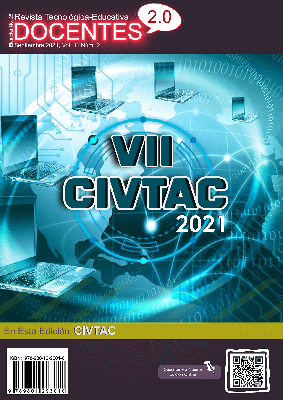Influence of Simulators and Determinant Factors in the Virtual Baccalaureate
 DOI:
https://doi.org/10.37843/rted.v11i2.250
DOI:
https://doi.org/10.37843/rted.v11i2.250
Main Article Content
Abstract
Downloads
Metrics
Article Details

This work is licensed under a Creative Commons Attribution-NonCommercial-NoDerivatives 4.0 International License.
Those authors who have publications in our journal accept the following terms:
- When a work is accepted for publication, the author retains rights of reproduction, distribution of his/her article for exploitation in all countries of the world in the format provided by our magazine and any other magnetic medium, optical, and digital.
- Authors will retain their copyright and guarantee the journal the right first to publish their work, which will be simultaneously subject to the Creative Commons Acknowledgment License (Attribution-NonCommercial-NoDerivatives 4.0 International (CC BY-NC-ND 4.0)). That allows third parties to copy and redistribute the material in any medium or format, under the following conditions: Acknowledgment - You must properly acknowledge authorship, provide a link to the license, and indicate if any changes have been made. You may do so in any reasonable way, but not in a way that suggests you have the licensor's endorsement or receive it for your use. NonCommercial - You may not use the material for a commercial purpose. NoDerivatives - If you remix, transform, or build from the material, you cannot broadcast the modified material. There are no additional restrictions - You cannot apply legal terms or technological measures that legally restrict you from doing what the license allows.
- Authors may adopt other non-exclusive license agreements to distribute the published version of the work (e.g., deposit it in an institutional archive or publish it in a monographic volume) provided that the initial publication in this journal is indicated.
- Authors are allowed and recommended to disseminate their work through the Internet (e.g., in institutional telematic archives, repositories, libraries, or their website), producing exciting exchanges and increasing the published work's citations.
- Request of withdrawal an article has to be done in writing by the author to the Editor, becoming effective after a written response from the Editor. For this purpose, the author or authors will send correspondence via e-mail: [email protected].
- The author will not receive financial compensation for the publication of his work.
- All Docentes 2.0 Journal publications are under the Open Journal System (OJS) platform at: https://ojs.docentes20.com/.
References
Arguedas, O. (2009). La pregunta de investigación. Acta Médica Costarricense 51 (2), 89-90. DOI: https://doi.org/10.51481/amc.v52i7.226
Avendaño-Rodríguez, K. C., Magaña-Medina, D. E. & Flores-Crespo, P. (2020). Influencia familiar en la elección de carreras STEM (Ciencia, tecnología, ingeniería y matemáticas) en estudiantes de bachillerato. Revista de Investigación Educativa, 38(2), 515–531. https://doi.org/10.6018/rie.366311 DOI: https://doi.org/10.6018/rie.366311
Hernández-Sampierí, R.; Fernández-Collado, C. & Baptista-Lucio, P. (2003). Metodología de la investigación, 3. ed. McGraw-Hill.
Giraldo, F., Molina, J & Córdoba, F. (2018). (Compls.). Experiencias de investigación en escenarios escolares. Elementos para una transformación educativa y social. Instituto Tecnológico Metropolitano.
Guba, E., & Lincoln, Y. (2002). Paradigmas en competencia en la investigación cualitativa. En Derman, C. & Haro, J. Por los rincones. Antología de métodos cualitativos en la investigación social. El Colegio Sonora.
Pineda-Castillo, K. A. (2021). Uso de Tecnología como Recurso Preponderante en el Aprendizaje a Distancia en tiempos de Confinamiento Social. Revista Tecnológica-Educativa Docentes 2.0, 11(1), 89–98. https://doi.org/10.37843/rted.v11i1.197 DOI: https://doi.org/10.37843/rted.v11i1.197
Moreno-Castañeda, M., Chan-Núñez, M., Flores-Briseño, M., Pérez-Alcalá, M. S., Ortiz-Ortiz, M. G., Hernández-Figueroa, V. G., … & Coronado-Ramírez, G. (2010). Modelo educativo del Sistema de Universidad Virtual. México: Sistema de Universidad Virtual. Universidad de Guadalajara.
Martínez-Sanz, R., Islas-Carmona, O., Campos-Domínguez, E. & Redondo-García, M. (2016). El profesor universitario de Comunicación: acceso, consumo y cultura mediática. Un estudio comparativo entre España y Méxic. Revista Latina de Comunicación Social, 71, 349-372.DOI: 10.4185/RLCS-2016-1099 DOI: https://doi.org/10.4185/RLCS-2016-1099
Saldaña-Acosta, J. M. (2021). Desarrollo de Actitudes de Colaboración, Cooperación e Innovadoras en el Aula Basado en Proyectos. Revista Tecnológica-Educativa Docentes 2.0, 11(1), 130–139. https://doi.org/10.37843/rted.v11i1.201 DOI: https://doi.org/10.37843/rted.v11i1.201
Toulmin, C. N. & Groome, M. (2017). Building a science, technology, engineering, and math agenda. National Governors Association.
Organización de las Naciones Unidas para la Educación, la Ciencia y la Cultura (Unesco). (2019). Women in Science. http://uis.unesco.org/sites/default/files/documents/fs55-women-in-science-2019-en.pdf
Zimmerman, A. (2016). Developing confidence in steam: exploring the challenges that novice elementary teachers face. The STEAM Journal. 2 (2), 1-11. https://scholarship.claremont.edu/cgi/viewcontent.cgi?referer=https://www.google.com/&h ttpsredir=1&article=1122&context=steam DOI: https://doi.org/10.5642/steam.20160202.15
Zornoza-Martínez, E. (2016). Aprendizaje con simuladores. Aplicación a las Redes de Comunicaciones. Revista de Nuevas Tecnologías y Sociedad, (42). http://dialnet.unirioja.es/servlet/articulo?codigo=1960039






